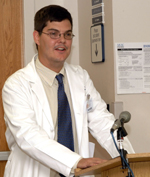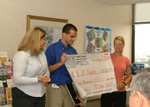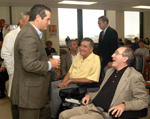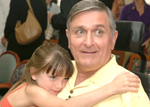ALS clinic opens doors among top
brass,
physicians, dignitaries
by
Heather WoolwinePublic Relations
Marking a leap forward in caring for patients with amyotrophic lateral sclerosis (ALS), or Lou Gehrig’s disease, the MUSC Interdisciplinary ALS Clinic opened its doors July 7. Patients suffering from ALS now have an all-in-one clinic in which they can meet a team of various health professionals dedicated to their overall symptom management within several hours.
MUSC university and medical center dignitaries, Charleston Mayor Joe Riley, Mount Pleasant Mayor Harry Hallman, clinic inspiration retired U.S. Air Force Brig. Gen. Thomas Mikolajcik, and Paul Hollen, ALS Association—S.C. chapter board chairman, attended the milestone-marking event for ALS patients and their families.
 Dr. David Stickler
welcomes dignitaries to the ALS clinic opening July 7.
Dr. David Stickler
welcomes dignitaries to the ALS clinic opening July 7.“This is the only ALS clinic of its kind in the state, and it will provide a great service to patients who truly need the convenience of one-stop quality health care,” said MUSC’s David Stickler, M.D., ALS clinic director and neurology assistant professor.
Highlighting the ceremony, MUSC physical therapy students presented the clinic a check for more than $31,000 that included proceeds raised during the HOPE (Helping Other People Endure) 5K race on the Isle of Palms June 3.
 MUSC physical
therapy students present a check to help in the opening of the MUSC
Interdisciplinary ALS Clinic, located in RutledgeTower.
MUSC physical
therapy students present a check to help in the opening of the MUSC
Interdisciplinary ALS Clinic, located in RutledgeTower.The interdisciplinary ALS clinic includes physicians with neurology expertise, occupational and physical therapists, speech pathologists, dietitians, respiratory therapists, a social worker, and local representatives from the ALS Association S.C. chapter and the Muscular Dystrophy Association (MDA). By partnering with MDA, the ALS clinic will be able to access greater resources and tap concurrent research on the two diseases.
Meanwhile, comprehensive palliative and supportive care is available for managing difficult symptoms experienced by ALS patients, especially those in the advanced stages of the disease.
“I continue to be overwhelmed by the support for this clinic. One main advantage of this clinic is that a patient doesn’t have to travel as much, which takes a lot of effort, and in one visit to this clinic they can receive a routine neuro-evaluation and a variety of other therapies,” Stickler said.
Five major principles are related to quality palliative and supportive care, which can benefit both the ALS patient and the family. Most significant is that this type of care respects the goals, likes and choices of the patient. This type of care looks after the medical, emotional, social and spiritual needs of the patient and also supports needs of caregivers and family members. Palliative care provides access to any and every health care provider needed by a patient and in the appropriate care settings. Last, this type of care always builds ways to provide excellent care at the end of life.
 Dean Stephens
(left), WCIV Channel 4 news anchor, and Dr. Jack Feussner, Department
of Medicine chairman (behind Stephens), greet Brig. Gen. Thomas
Mikolajcik (center), and D. Loy Stewart during the July 7 opening
of the MUSC Interdisciplinary ALS Clinic, ninth floor Rutledge Tower.
Dean Stephens
(left), WCIV Channel 4 news anchor, and Dr. Jack Feussner, Department
of Medicine chairman (behind Stephens), greet Brig. Gen. Thomas
Mikolajcik (center), and D. Loy Stewart during the July 7 opening
of the MUSC Interdisciplinary ALS Clinic, ninth floor Rutledge Tower. Temporarily located on the ninth floor of Rutledge Tower and sharing clinical space with the transplant clinic, the ALS clinic offers patients a reprieve from the stress of having to coordinate so many appointments during the course of several days. For most ALS patients who attend the MUSC clinic the first Friday of every month, the time spent going to medical appointments will be drastically reduced. As a result, patients and their families can focus on more important things, such as making the most of life outside the clinic walls.
“The literature supports interdisciplinary clinics for ALS patients, and there are only about 60 ALS Association or MDA-supported clinics in the country at this point in time,” Stickler said. “By opening this type of clinic, not only are we helping our patients and their quality of life, but we’re also opening the door to more funding for ALS research and the ability to offer clinical trials.”
Despite efforts, little has changed since the disease was first identified more than 100 years ago.
“What we know about ALS today is about as much as Lou Gehrig did,” said Jerome Kurent, M.D., General Internal Medicine and Neurology professor, referring to the baseball great who died of the disease named for him in 1939. The disease is a progressive and fatal neuromuscular disorder characterized by weakness and wasting of patients’ arms and legs, and the muscles related to breathing and swallowing. Most ALS patients die as a result of respiratory failure.
Patients still average three-to-five years of life from diagnosis, with many overwhelming and sometimes unmet needs transmitted onto caregivers. While some research has made strides in better treatments for symptoms, much work remains in the areas of understanding the illness’ origins and how to cure it. The actual cause of the illness is unknown, but scientists and clinicians have been able to determine some common characteristics in those who present with ALS. “For example, Gulf War veterans and professional athletes both seem to be groups that may be exposed to a lot of physical trauma and/or toxins, and these are populations where the incidence for ALS is higher,” Stickler said “It seems to be an illness with an onset associated with the prime of a person’s life, so age may be a factor in who gets ALS.”
Kurent said that pilots, both military and commercial, are more likely to suffer from the disease.
 Gen. Tom Mikolajcik
gets a hug from granddaughter Alexandria Vanderpool.
Gen. Tom Mikolajcik
gets a hug from granddaughter Alexandria Vanderpool.During the clinic’s opening ceremony, Mikolajcik said he hoped to see the MUSC interdisciplinary ALS clinic become a national example of how to help patients with ALS. “ALS is a devastating disease that has no cure, but patients can still have hope and lead a quality life. Even though there isn’t a cure, there needs to be hope for one,” he said. “We are still human beings and can function in a way productive to society. Clinics can help us lead a quality life for the short amount of time we have left to live.”
“We are deeply indebted to Gen. Mikolajcik and Mr. Hollen for their leadership and inspiration during the development of the clinic and for the inspiration they have provided to the greater Charleston community during various ALS events,” said Kurent. “We are also grateful to the ALS Association as primary supporters of the clinic, and look forward to additional collaborations with them and the Muscular Dystrophy Association of America. Our immediate goal is to develop the best ALS clinic possible to serve South Carolina patients and their families, and to provide a source of hope for the future. Our ultimate goal is to eradicate ALS and make it a thing of the past… I feel honored and privileged for being involved in this effort. This is a tremendous opportunity and hope for the future. Many who have ALS feel abandoned by society. If there is one place ALS families and patients can count on, it is this clinic.”
For more information about the ALS clinic or to make an appointment, call 971-0933 or toll-free 1-866-492-4821.
PR intern Maggie Diebolt contributed to this report.
Friday, July 14, 2006
Catalyst Online is published weekly,
updated
as needed and improved from time to time by the MUSC Office of Public
Relations
for the faculty, employees and students of the Medical University of
South
Carolina. Catalyst Online editor, Kim Draughn, can be reached at
792-4107
or by email, catalyst@musc.edu. Editorial copy can be submitted to
Catalyst
Online and to The Catalyst in print by fax, 792-6723, or by email to
catalyst@musc.edu. To place an ad in The Catalyst hardcopy, call Island
Publications at 849-1778, ext. 201.